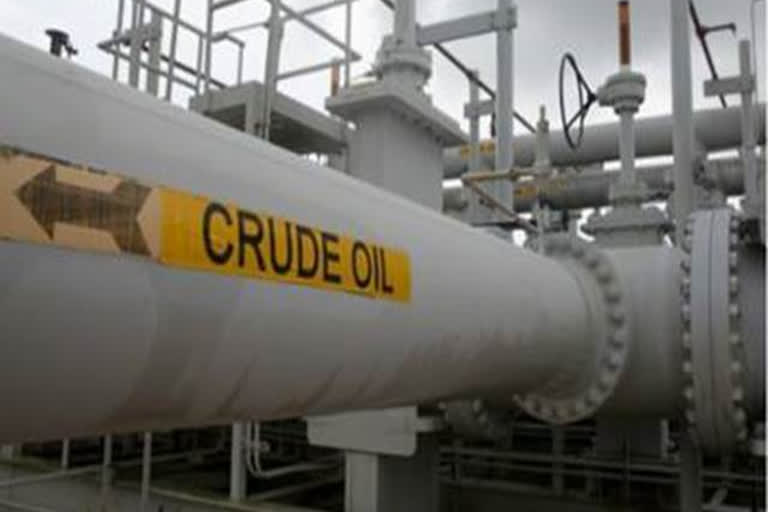नवी दिल्ली - व्हेनेझुएलावर अमेरिका आर्थिक निर्बंध घालण्याची शक्यता आहे. यामुळे भारत तेलइंधनाची गरज भागविण्यासाठी ब्राझील आणि मेक्सिकोकडून होणाऱ्या आयातीचे प्रमाण वाढविणार आहे.
सौदी अरेबिया, इराक आणि इराणनंतर व्हेनेझुएला हा भारताचा चौथ्या क्रमाकांचा तेलइंधन पुरवठादार देश आहे. २०१७-२०१८ मध्ये एकूण गरजेच्या ११ टक्के तेलइंधन व्हेनेझुएलामधून आयात करण्यात आले. मात्र, अमेरिका व्हेनेझुएलावर आर्थिक निर्बंध घालण्याची शक्यता असल्याने भारतीय तेलकंपन्यांना इतर पर्याय शोधायला भाग पडले आहे.
ब्राझील आणि मेक्सिको भारताला तेलपुरवठा करण्यासाठी उत्सुक-
ब्राझील आणि मेक्सिको या दोन्ही देशांनी उर्जा क्षेत्रातील सहकार्य वाढविण्याची इच्छा दर्शविली आहे. याबाबतच्या पर्यायाचा भारत विचार करत असल्याचे सुत्राने सांगितले. ब्राझील आणि मेक्सिको हे देश आघाडीचे तेल उत्पादक आहेत. जगभरातील तेलउत्पादक देशांमध्ये ब्राझीलचा १० वा क्रमांक आहे. तर मेक्सिकोचा ११ वा क्रमांक आहे. दोन्ही देशांकडून भारत तेलइंधन आयात करत असला तरी २०१३ नंतर हे प्रमाण कमी झाले आहे.
यामुळे व्हेनेझुएलावर येणार आर्थिक निर्बंध-
व्हेनेझुएलाचे राष्ट्राध्यक्ष निकोलस मदुराओ यांनी पायउतार होण्यासाठी अमेरिकन सरकार दबाव निर्माण करत आहे. त्यासाठी व्हेनेझुएलाच्या तेल निर्यातीवर अमेरिका निर्बंध आणणार आहे. त्याचा फटका व्हेनेझुएलाकडून तेल आयात करणाऱ्या देशांनाही होणार आहे.
व्हेनेझुएलामधून रिलायन्स इंडस्ट्रीज आणि नयारा एनर्जी (पूर्वीचे एस्सार ऑईल) या कंपन्यांनी तेलइंधनाच्या आयातीचे प्रमाण कमी केले आहे. व्हेनेझुएलामधून भारतामध्ये होणाऱ्या एकूण आयातीच्या ८० टक्के तेलइंधन रिलायन्स इंडस्ट्रीज आयात करते. हे प्रमाण २०१८ मध्ये प्रती दिवशी २ लाख ७० हजार बॅरल एवढे होते. मात्र, हे प्रमाण रिलायन्स इंडस्ट्रीजने कमी केले आहे.
Intro:Body:
India may step up oil imports from Brazil, Mexico
Venezuelan oil ,व्हेनेझुएला, तेलइंधन, US sanctions ,oil supplier ,oil production, oil imports,
ब्राझील आणि मेक्सिकोकडून आयात होणाऱ्या तेल इंधनाचे भारत प्रमाण वाढविणार
नवी दिल्ली - व्हेनेझुएलावर अमेरिका आर्थिक निर्बंध घालण्याची शक्यता आहे. यामुळे भारत तेलइंधनाची गरज भागविण्यासाठी ब्राझील आणि मेक्सिकोकडून होणाऱ्या आयातीचे प्रमाण वाढविणार आहे.
सौदी अरेबिया, इराक आणि इराणनंतर व्हेनेझुएला हा भारताचा चौथ्या क्रमाकांचा तेलइंधन पुरवठादार देश आहे. २०१७-२०१८ मध्ये एकूण गरजेच्या ११ टक्के तेलइंधन व्हेनेझुएलामधून आयात करण्यात आले. मात्र, अमेरिका व्हेनेझुएलावर आर्थिक निर्बंध घालण्याची शक्यता असल्याने भारतीय तेलकंपन्यांना इतर पर्याय शोधायला भाग पडले आहे.
ब्राझील आणि मेक्सिको तेलपुरवठा करण्यासाठी उत्सुक
ब्राझील आणि मेक्सिको या दोन्ही देशांनी उर्जा क्षेत्रातील सहकार्य वाढविण्याची इच्छा दर्शविली आहे. याबाबतच्या पर्यायाचा भारत विचार करत असल्याचे सुत्राने सांगितले. ब्राझील आणि मेक्सिको हे देश आघाडीचे तेल उत्पादक आहेत. जगभरातील तेलउत्पादक देशांमध्ये ब्राझीलचा १० वा क्रमांक आहे. तर मेक्सिकोचा ११ वा क्रमांक आहे. दोन्ही देशांकडून भारत तेलइंधन आयात करत असला तरी २०१३ नंतर हे प्रमाण कमी झाले आहे.
यामुळे व्हेनेझुएलावर येणार आर्थिक निर्बंध
व्हेनेझुएलाचे राष्ट्राध्यक्ष निकोलस मदुराओ यांनी पायउतार होण्यासाठी अमेरिकन सरकार दबाव निर्माण करत आहे. त्यासाठी व्हेनेझुएलाच्या तेल निर्यातीवर अमेरिका निर्बंध आणणार आहे. त्याचा फटका व्हेनेझुएलाकडून तेल आयात करणाऱ्या देशांनाही होणार आहे.
व्हेनेझुएलामधून रिलायन्स इंडस्ट्रीज आणि नयारा एनर्जी (पूर्वीचे एस्सार ऑईल) या कंपन्यांनी तेलइंधनाच्या आयातीचे प्रमाण कमी केले आहे. व्हेनेझुएलामधून भारतामध्ये होणाऱ्या एकूण आयातीच्या ८० टक्के तेलइंधन रिलायन्स इंडस्ट्रीज आयात करते. हे प्रमाण २०१८ मध्ये प्रती दिवशी २ लाख ७० हजार बॅरल एवढे होते. मात्र, हे प्रमाण रिलायन्स इंडस्ट्रीजने कमी केले आहे.
New Delhi - India may increase oil imports from Brazil and Mexico to offset the loss of Venezuelan oil in the wake of US sanctions on that country.
Venezuela is the fourth largest oil supplier to India after Saudi Arabia, Iraq and Iran. It accounted for about 11 per cent of India's oil supplies in 2017-18, supplying close to 18 million tonnes (mt). But the oil imports from Venezuela have come under threat following the US sanctions, forcing Indian companies to scout for alternate markets.
Diplomatic sources said that both Brazil and Mexico have expressed their desire to strengthen energy sector cooperation and India is evaluating the option and will take a call once it gets reports from its public and private sector oil marketing companies.
India shares good trade relation with both Mexico and Brazil. Both countries are also leading producers of oil, with Brazil at the 10th largest oil producer globally with a production of about 150 million tonnes (mt) of crude and Mexico at 11th position (production 110 mt).
"The two countries can be useful alternate to Venezuelan oil but a decision to enhance imports would depend only after accessing the quality of oil and terms of supply that should be comparable with of Venezuela," said the source.
India is already importing oil from both Brazil and Mexico but the quantity had come down progressively since 2013. While India imported crude worth $ 3.50 billion and $ 1.78 billion from Mexico and Brazil respectively in 2013, this went down to $1.38 billion and $0.81 billion now.
Mexico's state oil company Pemex has reported a decline in production due to its ageing fields resulting in lower output. But the situation may change soon with a new government pushing up production focusing on inviting foreign investment in their fields. Brazil also is undertaking big reforms in the energy sector to increase production and exports of oil.
India imported 155 mt of oil in 2017-18. The imports are expected to hit over 170 mt in FY19 with Saudi Arabia being the largest supplier followed by Iraq and Iran. Oil imports from Iran are already on the decline due to US sanctions. This is expected reduce further once the US removes the waiver given to certain oil importing countries.
The US is seeking to cut off Venezuela's oil revenue as part of its efforts to build pressure on President Nicolas Maduro to step down. The sanctions mean that anyone using US banking channels or having a big presence in the US and continuing to deal with Venezuela will also face restrictions.
In view of this, Indian buyers such as Reliance Industries and Nayara Energy (formerly Essar Oil) have already reduced oil imports. These companies are big on oil imports from Venezuela. In fact, Reliance Industries accounted for 80 per cent of Venezuelan oil imports to India in 2018 at 270,000 barrels a day. But the company has reduced its purchases of Venezuelan crude oil to well below its contracted levels.
Conclusion:



